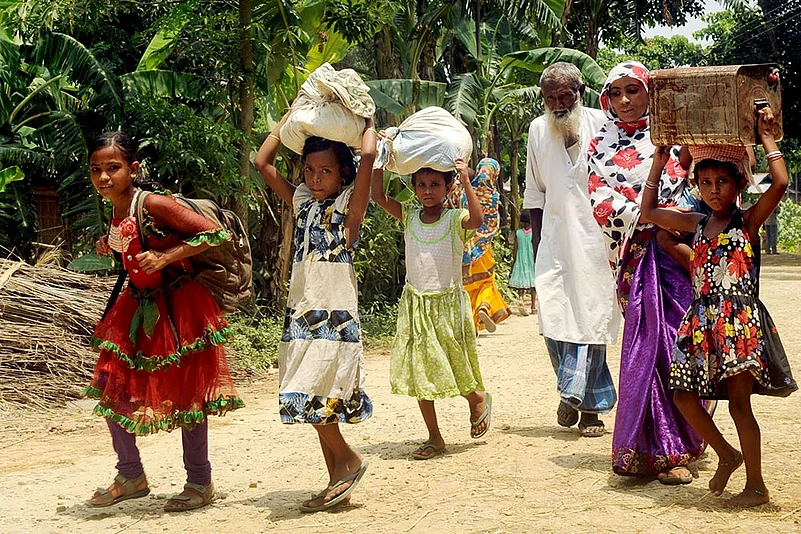It was drizzling on the evening of May 18, the day before the counting for the assembly polls, held over a month ago. An anxious Zarina Khatun was busy luring her children, Zariful, 11, and Sania, 8, indoors with the promise of hot rotis and fried fish when the police arrived. A neighbour called up her husband Shamsul Haque, a van-rickshaw puller; before he could rush back, the police had taken her away. The 37-year-old found herself in judicial custody on suspicion of being an “illegal immigrant”.
“I rushed home to find my children screaming and crying in fear,” he said, his eyes welling up, when Outlook caught up with him three weeks later. The fear and trauma of their mother’s arrest plays large in the eyes of the two children.
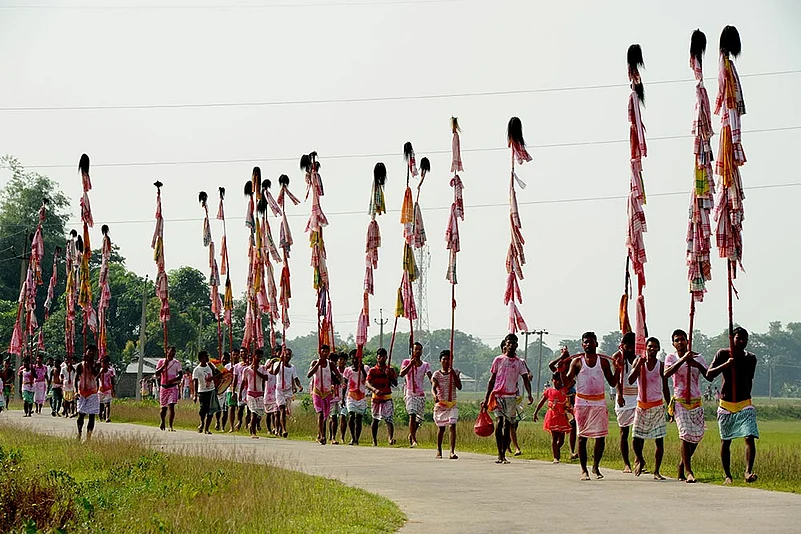
Rajbanshis in Kokrajhar celebrate Kali puja with a ritual procession
Zarina was arrested even as the National Register of Citizenship (NRC) is being renewed. The exercise, first undertaken in 1951, is designed to identify and eventually deport ‘foreigners’. The current round, to be completed by August, has acquired an extra edge after the BJP-AGP combine won the elections by promising to rid Assam of illegal migrants. Tarun Gogoi, the previous CM, had claimed that this round of the NCR was initiated in 2015, when he was still in office. “This was my baby,” he’d said. “It’s important to ensure that a humanitarian crisis does not emerge in Assam because of this. This is a complex problem involving human beings, innocent men, women and children. It must be dealt with sensitively. Let the solution not become a bigger problem than the problem itself.”
But his Congress party stands widely accused of not taking the problem seriously enough. A former Assam governor, Lt Gen S.K. Sinha, recalled in a recent article that a former Congress president from the state, D.K. Barooah—of ‘India is Indira, Indira is India’ fame—had publicly said that the Congress would never have any trouble in the state as long as ‘Alis and coolies’ (referring to Muslims and workers from outside) were happy. Gogoi, too, is accused of pandering to illegal migrants; during the campaign, both the BJP and the AGP accused him of allowing the situation to drift during his three-term chief ministership. Why, they asked, was the NCR process started only in 2015, just before election year?
The foreigners’ issue, observers have pointed out, surfaces before every election and is potent enough to instal or unseat governments. The fear of the foreigner grabbing land and employment has been there since pre-Independence days. And experts quote British civil servant C.S. Mullan as saying as long back as in 1931 that a vast horde of “land-hungry Bengali immigrants, mostly Muslims from eastern Bengal” were likely to alter permanently the “whole structure of Assamese culture and civilisation”. The agitation by the All Assam Students Union (AASU) from 1979 to 1985 was premised on a similar paranoia. Flushing out the foreigner, therefore, remains an attractive poll promise.
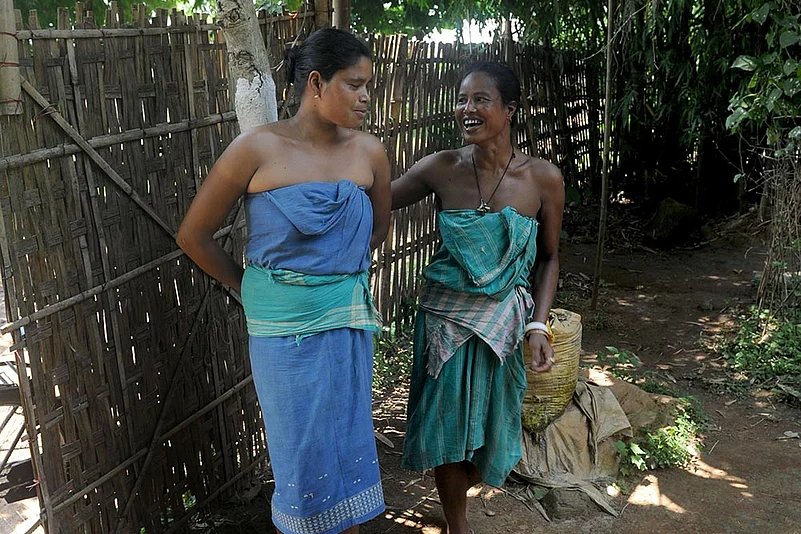
Collects & sells minor forest produce Chandradinga village, Goalpara, NRC status: filed
We are the original tribal Assamese, indigenous to these hills. Our ancestors have lived here for hundreds of years. All of us had to fill the NRC forms. The process is meant to help the authorities decide who has a right to live on this land. While no one is asking us any questions, yet we do worry about some of those who live in neighbouring villages along the border or on the river banks. Many of them no longer feel as safe, including some of our friends. We usually meet them at the local market 3 km away, where we sell the forest produce we gather. In summer we pick mango, jackfruit, banana and coconut, and transport them in our handmade wooden-bamboo cart. My husband goes to the market with a relative. We also cultivate small patches of the hillside that are owned by no one. What will happen to those who don’t have these privileges? Where will they go after the results come out?
Two new elements were introduced after BJP’s landslide win at the Centre in the general election of 2014. The Modi government tweaked passport rules to make it possible for Hindus from Pakistan and Bangladesh to stay on in India with far less documentary evidence. Thus ‘Hindu illegals’ are welcome; Muslims are a problem.
The other new element was introduced by Congress renegade Himanta Biswa Sarma (who joined the BJP) and present CM Sarbananda Sonowal. During the campaign, they promised to push back the cut-off year from 1971 to 1951: only those migrants who could prove they had been here by 1951 would be counted as Indian citizens. This would render many lakhs of settlers illegal and call for their deportation. On becoming CM, however, Sonowal categorically told Outlook in an interview that 1971 would remain the cut-off year.
But on the ground, there is a growing fear, fuelled by arrests like that of Zarina. In Dhubri district, where the border is particularly porous and riverine lowlands offer safe passage and refuge, a panchayat chief says, “I can sense a time-bomb ticking. A humanitarian crisis is about to erupt.” Similar concerns are raised in Kokrajhar and Goalpara districts of Lower Assam, with a high concentration of poor Muslims.
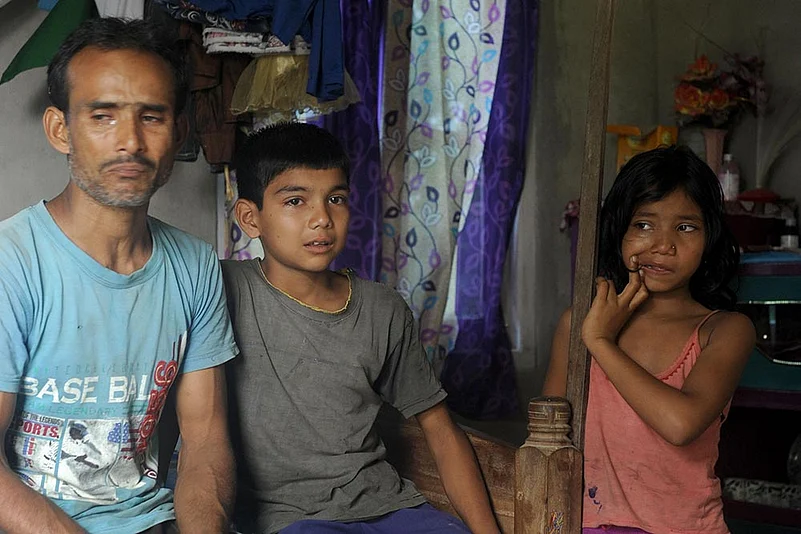
Van-rickshaw puller Lakkhigunge village, Dhubri, NRC status: filed
Imake a living transporting building material in my van-rickshaw. This brings me Rs 200 on a normal day. One evening, when I was at work, I got a call. It was my neighbour. The police had picked up my wife. We have been living in Assam for three generations now. My wife, with whom I have a son (11) and a daughter (8), is from neighbouring Kokrajhar district. We vote every time there are polls. Yet, the foreign tribunal summoned my wife when the NRC process was going on. We had applied for NRC status with the necessary documents, but they demanded more papers. We tried our best but voter IDs were all we could show. It’s worse in flood-prone lower Assam as we have to flee our homes in a hurry when the waters rush in, and sometimes the papers get left behind. I rushed home and my heart broke when I saw our children wailing. The next morning their mother was taken to court and remanded to judicial custody. We don’t know why as she is on the voter list. We have applied for bail.
“Will everything be okay for us?” asks Hazera Khatun, clutching a ration card as proof of residence. It isn’t possible to make out the year of issue. “We had to leave everything behind during the floods four years ago. When we came back everything was damp and parts of these documents got smudged.” Wherever the Outlook team went, villagers scrambled for documents in proof of citizenship in the hope that the media would help them convince the NRC authorities. “Whatever their situation, they know these documents are more precious to them than gold or silver,” says Nur Alam, a panchayat president of a village in Dhubri. “Their lives depend on them. One piece of paper missing and it could mean arrest or deportation.” But having the right papers is just the first step, says Alam, who has been helping villagers with the NRC procedures. “By no means does a ration card or a voter ID card or even a birth certificate or school record guarantee that you will pass the test of citizenship. It is just a means to an end. Every documented proof that you submit along with the NRC application is just a support for your claim that you are a citizen,” he says.
The NRC application form not only asks for proof of residence or birth, it also demands a range of other documents, one of which is called a “link certificate” or the “legacy certificate”. This is a certificate the administration grants after people have furnished proof not just of their own residence, but also that of their entire paternal side of the family having lived in Assam or any part of India. In the case of married women, they are to furnish documentary proof of their paternal side’s residency in Assam before marriage; similar proof of the husband’s or in-laws’ residence in India will not do. There’s enough scope for families to be broken up. And if a person was born in Assam in 1972 and can prove it with a birth certificate but can’t prove that his father was domiciled in Assam by 1971, he’ll have to go. It’s either deportation or—if the Bangladesh authorities don’t accept you as their citizen—it’s detention or jail.
“It’s one of the most complicated forms I’ve ever dealt with in my life,” says Basudev Kundu, 42, a school-teacher, speaking of the categories and sub-categories to be filled out for the NRC process. “My head swirled when I first looked at the form, but couldn’t make head or tail out of it. And imagine, I’m an educated man. Think of the thousands of illiterate people living in this land.” Even so, he “whole-heartedly” supports the NRC documentation drive, which he says is “much needed”. He points out that the administration had set up hundreds of NRC camps where officials explain how to go about filling up the forms and supplying the required documentary evidence. People who know how to go about the procedure are also volunteering their help to those who don’t.
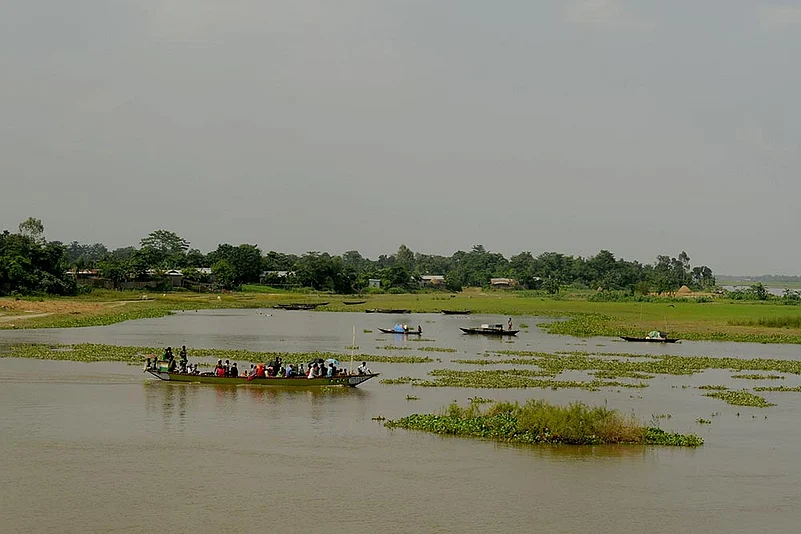
An island on the Brahmaputra near the Bangladesh border in Dhubri district
Speaking to Outlook, Kokrajhar deputy commissioner Madhab Prasad Sarma, who is in charge of NRC documentation in the district, admits that the process is complex. “In fact, when we first undertook the drive in the beginning of this year, there were some protests,” he says. His district and Dhubri had witnessed violent clashes: residents had attacked and driven away officials. “Many Muslims felt that the identification drive was targeted at them and intended to flush them out, but that was not the case at all,” says Sarma. “It’s just a citizenship register and Indian/Assamese Muslims will of course be as much a part of it as Hindu Indians/Assamese.”
It’s no secret that Hindus feel more secure during this drive than their Muslim brethren. Both Himanta Biswa Sarma and the new chief minister have expressed the desire to embrace Hindus who have fled from Bangladesh, giving the reason that these entrants to the country—even if their entry were illegal—had crossed over because of religious persecution in those countries. It is a message that is resonating across Assam loud and clear.
A report about the Union home ministry “being ready with the draft amendments to the citizenship law” made it to the front page of the Guwahati edition of The Sentinel, one of the largest circulated English dailies in the region. It reads, “The draft amendments will exempt minority citizens of Pakistan and Bangladesh who have come to India out of fear of religious persecution being targeted as ‘illegal immigrants’.” This, says Mukhtarul Rahman, a 26-year-old student from Kokrajhar, is making many Muslims in Assam feel like second-class citizens. “When a Hindu and a Muslim go for getting a document signed or certified by any local authority, the Muslim is always treated with some suspicion. The Hindus almost always come away with a signature, but the Muslim is often turned away. I am not saying that the discrimination is intentional, but when it comes to a Muslim, no one wants to take chances. ‘What if he is an illegal migrant?’ the authorities and officials feel,” says Mukhtarul Rahman. “Contrary to the theory that Muslims of Assam don’t like the fact that NRC documentation is taking place, most of us who are genuine Assamese Muslims are actually rooting for it, even more than the Hindus, I think. This is because we are sick and tired of the stigma. Whenever a Muslim name is pronounced, everyone jumps to the conclusion that we must be Bangladeshi ‘illegals’. Once the NRC process is done, it will put a stop to such nonsense once and for all.”
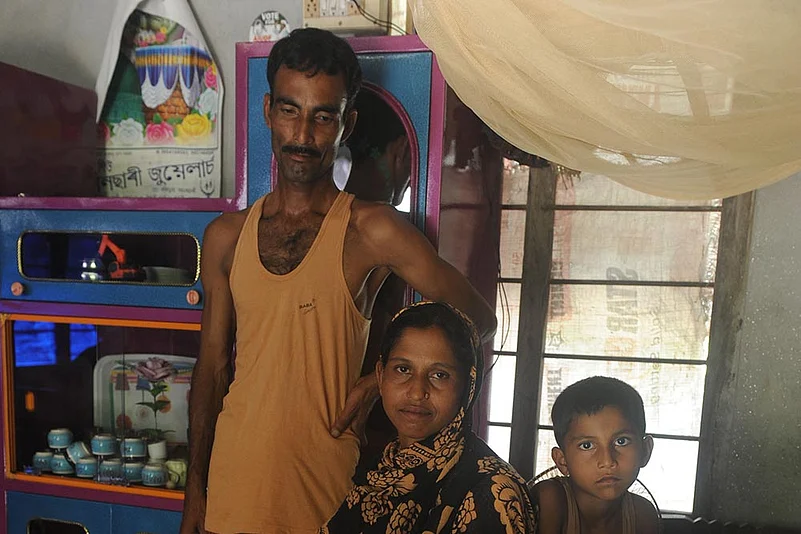
Homemaker, Lakkhigunge village, Dhubri, NRC status: filed
I was cooking when my son Abdul (5) came running to me. He had been playing outside with the neighbourhood boys and that’s how he heard that the police had picked up his friend’s mother. He was scared it could happen to me too. Holding my hand, he said, “If they take you to jail, I will go with you.” Zarina Khatun’s arrest as a suspected “foreign national” (illegal immigrant) had frightened the whole village. But I am not scared as I have done no wrong. I was born in Assam and studied till Class 8 at Lakkhigunge Girls’ High School. My name is on the school register and I have also voted in elections. Yet, my name figured in the “D-voter (doubtful voter) when the NRC process started and my voter-ID was stamped with a ‘D’. My husband worked as a polling agent; that’s how we got to know this during the assembly election and eventually I could not vote, for the first time since I turned 18. I don’t know what’s I store for me but I am not going to flee. This is my country, after all.
Another student, a Muslim boy who studies history in a Guwahati college, tells Outlook, “Even persecution exists, not to mention discrimination.” Referring to the appearance of the “D-voter” mark (or doubtful voter) in the electoral rolls, especially in lower Assam districts close to the border, he says it is reminiscent of the Star of Davids that Jews were made to wear in Nazi Germany. “If you go through the list of Ds you will be hard put to find a religious name that is not Muslim.”
Alam, the panchayat president, explains why women are finding it more difficult to produce documents. He says, “More women are finding themselves stamped as D-voters. There is a perception that this is because men go to Bangladesh, marry and return with their new brides, who are illegal immigrants. But that is not so in most cases. The reason women are finding it difficult to produce documents is that when they get married, they don’t carry the documents of their fathers and grandfathers. Often, their paternal homes are so far they cannot go back to get them as proof. Don’t forget also that those same documents are also being used by her paternal family, because they are also filing the NRC. But those are of vital importance to establish ‘link’ or ‘legacy’ in the NRC documentation process.”
Villagers also complain that census and NRC officials are lackadaisical and callous. Says 77-year-old Sheikh Ali, “Were they really that serious while counting? Even today, when everything is computerised, officials sit in one place and finish the counting in a hurry. They don’t even bother to get the spelling of the names correctly.” Immediately, a chorus of complains about the problem arises from villagers.
Dismissing these concerns, the Kokrajhar DC says, “There is a long list of documents that the NRC accepts. Every poor person these days at least has a ration card or his or her name is in the voter list. But we absolutely have to have some stringent method of ensuring genuineness.” Agreeing that spelling errors and typos do occur during the registration process, he claims that “these are most often so minor that they are easily corrected”. “The name can’t be completely different. One or two letters may be wrong but the way the name is pronounced is taken into consideration,” he says.
Officials claim that the entire process of documentation is foolproof and that not a single person living in Assam is being left out. “Everyone has filed their NRC forms,” says the deputy commissioner. What about those who want to escape the glare—the real illegal immigrants—and don’t want to get themselves registered? Can’t they just give it the slip and carry on with their lives? “When residents of an entire state are required to have identity proofs of their citizenship, someone who doesn’t have it will be an immediate suspect,” explains the deputy commissioner. “He may not get caught immediately but how long can a person hide? Everywhere, these days ID proof is required. Even if he wants to get employed in any state in India, he will first have to prove his credentials.”

Student leader, Kochua Gaon, Dhubri, NRC status: filed
Four generations ago, just after independence, we came here fleeing religious persecution in Bangladesh. Now we are Assamese in every way. I think NRC is a good initiative. We do have a problem of illegal immigration. I know because I live barely 30 km from the border. Every other day I see herds of cows being taken there. The “Indian agents” are mostly Bangladeshi immigrants who work with local thugs. And why not? A cow’s price trebles when it is taken across the border. Bangladeshis are a burden on our economy. They steal our jobs and grab subsidised ration and low-cost housing—only citizens are entitled to that. NRC is not anti-Muslim and those who are really Indian and Assamese among that community are also supporting it. They face the same problems as us due to the illegal ones. Anyway, Hindus have little to worry about as the government says Hindu immigrants fleeing persecution abroad are welcome. We are just waiting for the NRC results to see who stays and who goes.
Says S.P. Saikia, Kokrajhar superintendent of police, “Fabrication of documents is a crime and some arrests have already been made in that context.” His office has also been put in charge of “providing security to NRC officials”.
There have been instances of intimidation and some officials have been verbally abused and have received threats of physical violence. Laksha Hira Das Choudhury, 56, block development officer of Udmari gram panchayat, heads the NRC centre at Kashipara. “We don’t have time to waste. We start early. Arrive by 10 am and leave at 5:30 pm,” she says.By and large, officials claim, the process has gone off remarkably smoothly. “Now, we have to wait till August for the final list. No one who is a genuine Indian has anything to worry about,” says one.
But in spite of such reassuring words, many in Assam, especially Muslim families, are insecure. Complicated words like ‘D-voter’, ‘link certificate’, ‘NRC’ and ‘FT’ (foreign tribunal) have become common terminology. So have words like ‘detention centres’, ‘arrest’ and ‘jail’. “Initially, when illegal immigrants were caught, they used to be handed over to the BSF and released, the police terminology being ‘pushed back’, at the border. But soon they would come back. The problem is that the other country doesn’t always accept that people belong to that country in the absence of proof. Now, the method is that once captured, they are lodged in jail. We then write to our foreign ministry for taking up the matter with the suspect’s country of origin. If a dialogue is reached, deportation takes place. Otherwise, they continue to simply languish in our jails,” an official explains.
A police official from Dhubri says on condition of anonymity, “The detention centres are already housing many illegal immigrants. Our taxpayers’ money is being spent on feeding and clothing them. It is anybody’s guess what would happen now the results are out. Our jails would experience a population explosion.” At the Kokrajhar detention centre, Rumana Begum, Amirunissa and Mahmooda, who have admitted that they are Bangladeshis, have not yet been repatriated. Nor has Sushi Thapa from Mandayalay. For those who claim to be Indian, the hope of release is even less. In this scenario, the arrests are as much cause for concern for the officials as for the villagers.
“We try our best to avoid an arrest but often it is unavoidable,” explains K.K. Chandak, of the foreign tribunal in Kokrajhar. As far as Zarina Begum’s case is concerned, the tribunal claims that it is because she could not produce required documents despite repeated requests to appear in court. Her relatives, however, think this might be a case of persecution. “She is not even listed as a D-voter,” says a worried neighbor. “This is intentional. To create fear in us so that we can leave. But where will we flee to? This is our land.”
***
Foreigners, Refugees Or Indians?
- 1,36,448 Doubtful voters identified in the state of Assam
- 38,186 Foreigners detected by tribunals till 2014
- 2,448 Outsiders claimed to have been pushed back
- 38,000 Persons said to have absconded or died
- 68 Accused said to be in detention centres, to be expelled
Source: Media reports quoting Assam Government in 2014
***
Identity Crisis
How the issue of ‘illegal immigrants’, festering for 30 years, has come to the fore in Assam with a BJP-AGP govt in charge
- 1979-85 855 students die during the agitation spearheaded by the All Assam Students’ Union (AASU) demanding ouster of foreigners who came in after 1951
- 1985 Assam accord signed by Rajiv Gandhi government, elections held and an AGP government headed by former AASU leader Prafulla Mahanta sworn in
- 1986 The first of the foreigners tribunals set up in the state
- 1988 IMDT tribunals constituted
- 2014 64 new foreigners tribunals set up in addition to the existing 36
- 2015 Guwahati High Court ordered by the Supreme Court to set up a special bench to monitor functioning of the tribunals
- 2015 Tarun Gogoi government claims to have completed fencing 176 km of the 213 km border with Bangladesh and installing floodlights along the border
- 2016 BJP-AGP govt sworn in, vows to fence the border in two years and expel ‘foreigners’ from the state
***
When Shove Comes To Push
The Issue
- Uncertain identity The exact number of illegal immigrants in Assam is not known. Figures vary from several thousands to lakhs. UN estimated 2,04,600 refugees and asylum seekers to be in India in 2011.
The Concerns
- Majority fears Assamese researchers say ethnic Assamese will be reduced to a minority by 2047. Assamese language, culture, livelihood and land, they say, is threatened by Bangladeshi illegals.
The Cutoff
- Pre-1971 On a petition filed by the present CM, Sarbananda Sonowal, Supreme Court in 2005 struck down the IMDT Act by which migrants coming to India before 1971 were allowed to stay
The Renewal
- National Register In 2014, the apex court ordered the central government to take steps to detect and deport ‘foreigners’ and set up a National Register for Citizens (NCR). The exercise is currently on.
The Parties
- Broad Consensus All political parties broadly agree that illegal immigrants who settled after March 1971 need to be deported. But the Modi government wants Hindus from Pakistan and Bangladesh to stay.
The Position
- Open-door policy India allows refugees to stay and work in the country. But it has not signed the 1951 UN Refugee Convention or its 1967 Protocol, which restrains nations from forcibly repatriating a refugee.
***
What The Politicians Say

By Dola Mitra in Dhubri, Kokrajhar & Guwahati Photographs by Sandipan Chatterjee






